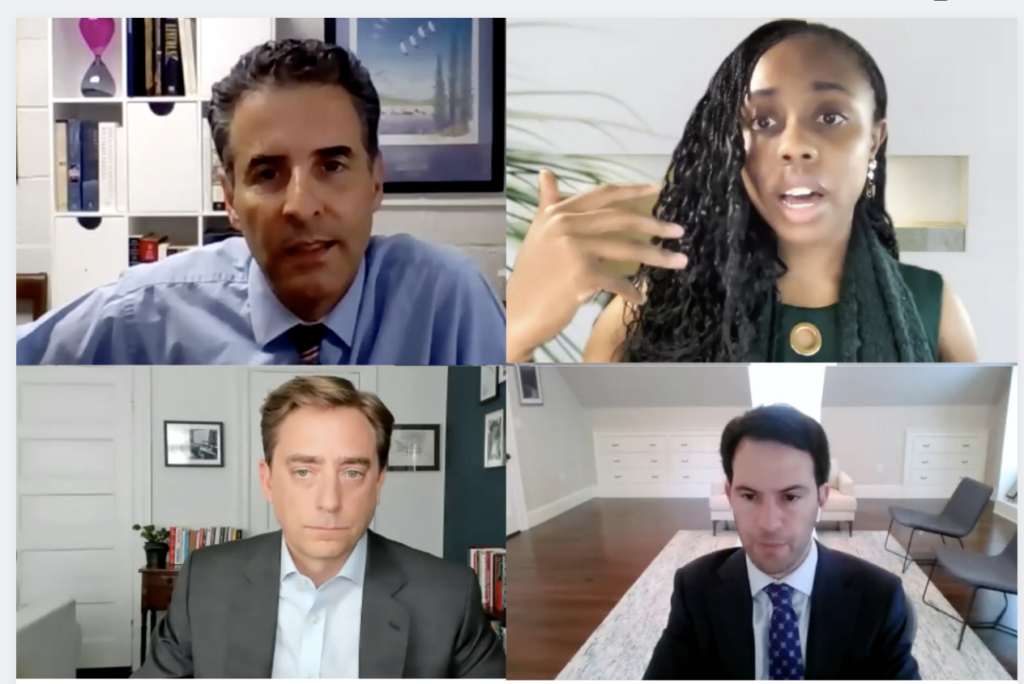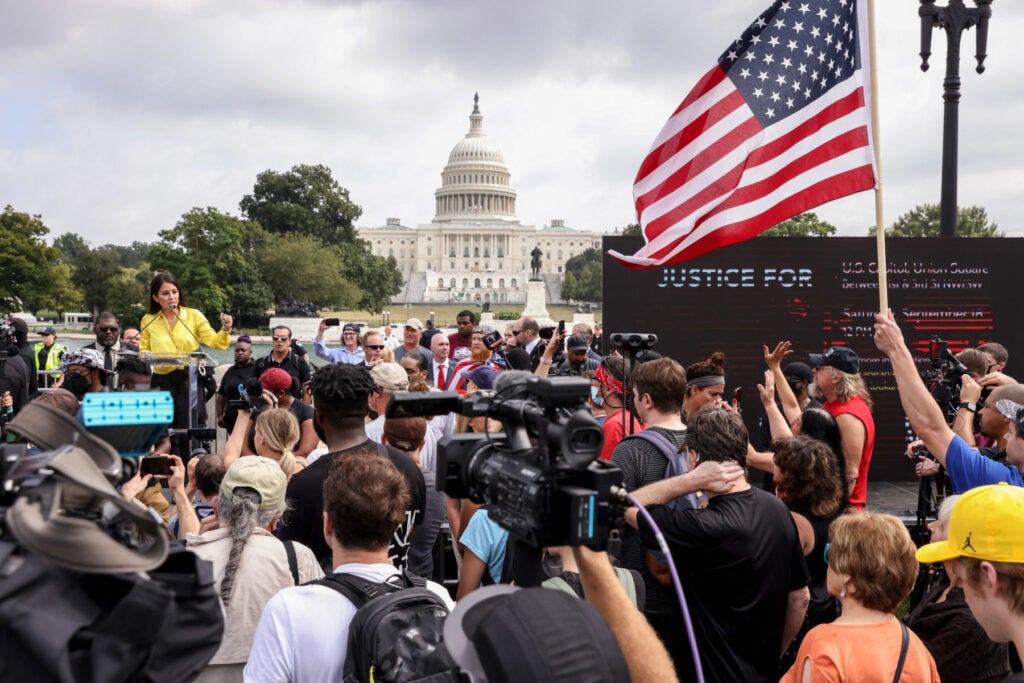By Brett Milano
Supporters of those charged in the January 6 attack on the U.S. Capitol gathered at the ‘Justice for J6’ rally on September 18, 2021 in Washington, DC.
The state of American democracy will be examined in a lecture series, “Democracy,” which had its first session this week and will continue through the fall and spring. Organized by Ruth Greenwood, the director of HLS’ Election Law Clinic, the series will feature virtual discussions by leading legal and political scholars on the most pressing challenges and possible solutions.
“The rules by which we govern our democracy have never been under more scrutiny than they are today,” Greenwood said in an interview this week. “From the unpeaceful transfer of power on January 6, 2021, the hundreds of bills aimed at restricting voting access introduced across state legislatures, to Congress finally seriously considering a sweeping electoral reform bill, the Freedom to Vote Act, every aspect of elections seems up for debate.”
The new series is one of many ways that Harvard Law School is enabling students, faculty, and staff to engage on issues related to elections and voting. In addition to launching the new Election Law Clinic last year, Greenwood noted that Harvard Law School had also hired “renowned democracy scholar” Professor Guy-Uriel Charles to join Professor Lawrence Lessig and Professor Nicholas Stephanopoulos as experts in election law.
“We wanted to introduce the HLS community to the wealth of talent that resides at HLS and to discuss and debate the most pressing issues facing our democracy,” she said.
Monday’s inaugural panel, called “Democracy in Peril,” dealt with the underlying causes of the current crisis, and offered a potential solution in legislation, H.R.1 (the “For the People Act”), whose cosponsor, Congressman John Sarbanes ’88 (D-Md.), participated on the panel.
In his opening remarks as moderator, Stephanopoulos said he believed that this is indeed a fraught moment for American democracy. “Allegations of voter suppression, election subversion and gerrymandering fill the airwaves and the pages of legal briefs. Claims of widespread election fraud are quite common, if unsupported by evidence. There’s more election litigation than ever before in American history. … So the timing of this session couldn’t be better.”
“We’ve reached this moment because of a deep cynicism out there in the body politic,” added Sarbanes. This mood, he said, was most successfully exploited by Donald Trump in 2016. “The public in a sense used the blunt instrument of his view on how to fix things, which was to come to Washington and attack corruption in the frame that he built.”

Clockwise from top left: Rep. John Sarbanes ’88 (D-Md.); Esosa Osa, research and policy director at Fair Fight Action; Harvard Law School Professor and discussion moderator Nicholas Stephanopoulos; and journalist and author Evan Osnos.
Sarbanes saw the way forward in H.R.1, which would expand voting rights and overhaul campaign finance laws. Passed in the House in March, the bill is currently stalled in the Senate — but a related Senate bill, the Freedom to Vote Act, was introduced by Democrats this week. “In the coming weeks, we’ll see whether success is at hand. If so, we’ll have done something transformative.”
During the Q&A session, Stephanopoulos asked if either bill could withstand Republican pushback if passed. “Absolutely, there’ll be a gazillion challenges the next day,” Sarbanes said. “But I think we’ve built these bills in a way that anchors them constitutionally.”
The belief in the potential importance of H.R. 1 was also emphasized by Esosa Osa, the research and policy director for Fair Fight Action, the voting rights organization founded by Stacey Abrams. Osa addressed the proliferation of bills across the nation that she believes suppress the vote by impeding voter registration and the casting and counting of ballots.
Such bills, she said, are accompanied by disinformation campaigns that create an impression of voter fraud, and thus facilitate further suppression. This has also led to election officials being threatened and resigning — as many as one-third in some Georgia counties.
“There are multiple levels of harm here,” Osa said. “When you are surrounded by disinformation, trying to provide guidance to voters, you end up in a situation where democracy is truly in peril.”
New Yorker magazine staff writer Evan Osnos gave a detailed look at how he believes we got here, and suggested that the roots extend far past the Trump era. As of a few years ago, he noted, Congress was 82 percent men, 83 percent white, and 50 percent millionaires. “That didn’t happen overnight. The effect was that large portions of Americans were feeling that the system was incapable of serving its most basic function, which is taking the public will and putting it into the work of government.”
The result was frustration on both sides of the aisle, leading to the Occupy movement on the left and the Tea Party on the right. Coupled with this, he said, was a climate of xenophobia since 9/11 (for instance, most Americans, he noted, greatly overestimate the number of Muslims in America), and a “combat mindset” that has entered the mainstream.
“What I’m describing is a culture of how it became possible that the leading members of a major American political party could think it’s OK to systematically deprive Americans of the right to vote,” said Osnos.
The series continues next month with a look at the future of the Voting Rights Act, moderated by Professor Guy Uriel-Charles. Future panels will examine ballot initiatives, money in politics, and gerrymandering. And a November session will address the question of whether social media’s effect on democracy has been constructive or destructive.
“I don’t know the answer to this, which is why I am so eager to have the expert panelists come and talk about it,” Greenwood said. “Social media has done so much good in bringing democracy closer to the people, but it has also encouraged the lesser angels of our nature to take over in harmful, and sometimes violent, ways. How can we harness the good while restricting the evil? I hope the HLS community can engage with our expert panel to work out some solutions.”
Greenwood says that the work of exploring these questions through this series is key to helping find solutions.
“Identifying problems is no good if you don’t also think through how to mitigate them,” she said. “The Democracy series is intended not only to make the HLS community aware of the issues facing our democracy, but to workshop how we might all work together to solve the biggest democratic malfunctions. We might even generate an idea or two that the Election Law Clinic can use in litigation or advocacy. We want to bring diverse voices to each conversation so that we can explore the many sides of every issue, and, hopefully, work out some paths forward.”
Filed in: Updates
Tags: Election Law Clinic
Contact Office of Clinical and Pro Bono Programs
Website:
hls.harvard.edu/clinics
Email:
clinical@law.harvard.edu
